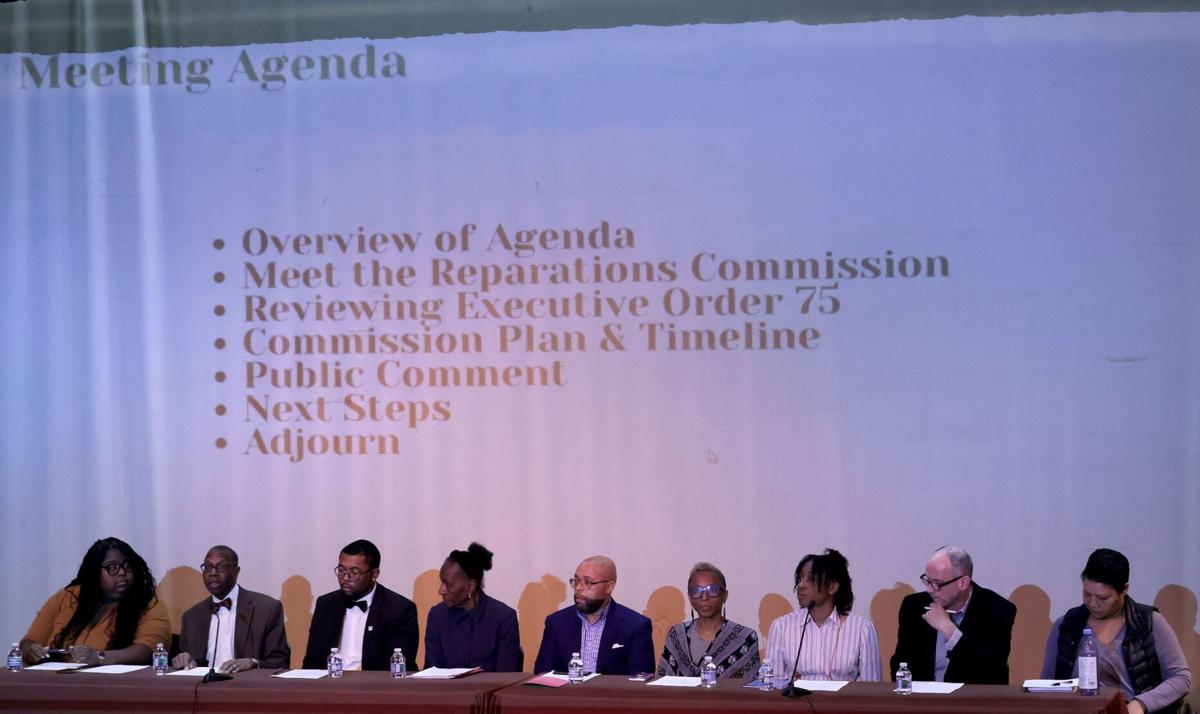ST. LOUIS ÔÇö A meeting of the cityÔÇÖs Reparations Commission went off the rails this week when some in its audience began blasting its approach to public engagement.
Several people suggested the commission had been less than transparent about its process for writing a critical report to city officials on reparations for slavery and anti-Black discrimination. They complained that they didnÔÇÖt know who exactly was working on the report. They said they couldnÔÇÖt get timely notice for meetings. And most of all, they said, the commission hasnÔÇÖt done nearly enough to get people to show up.
There were around 30 people ÔÇö and several empty chairs ÔÇö in the audience at the Deaconess Foundation on Wednesday night.
ÔÇ£They canÔÇÖt fill a room with Black people for a meeting on reparations, in north ├█ª┐┤½├¢, in 2023,ÔÇØ said Tory Russell, who gained a reputation during the 2014 Ferguson protests. ÔÇ£I donÔÇÖt think they care if the community shows up.ÔÇØ
People are also reading…
The rebukes made for a remarkable ending to the commissionÔÇÖs eighth public input meeting this year. Mayor Tishaura O. Jones formed the task force to investigate the impacts of slavery and discrimination and facilitate a ÔÇ£robust public dialogueÔÇØ around what happened and what should happen next, and report back to Jones and the aldermen early next year. If the public dialogue is seen as insufficient, it could cast a pall over the bodyÔÇÖs recommendations.
Dr. Will Ross, the commissionÔÇÖs vice chairman, appeared chastened by the end of the meeting.
ÔÇ£We are not happy with the turnout,ÔÇØ he said. ÔÇ£It should be unacceptable. It is unacceptable.ÔÇØ
The commission, he said, needs money from City Hall to get the word out better about its work.
Nick Dunne, the mayorÔÇÖs press secretary, said Thursday that Jones does care about the task forceÔÇÖs work and wants it to succeed. But he said none of the cityÔÇÖs other 100 or so boards or commissions have budgets for outreach, and that the commission has done a good job drawing audiences itself.
ÔÇ£If they want more turnout and more outreach, IÔÇÖm eager to have that conversation,ÔÇØ he said.
The outbursts followed months of more muted criticism of the commissionÔÇÖs process. There have been issues getting meeting locations posted on the cityÔÇÖs website more than a few days beforehand. There have been questions about why elected officials who will act on the commissionÔÇÖs recommendations havenÔÇÖt been at meetings. And some people have simply expressed impatience: They want reparations, and they want them now.
But on Wednesday night, it was all that and more.
It started when Russell, the Ferguson activist, asked who would be writing the report, and which institutions had been brought in to consult. That triggered a lengthy back-and-forth where commissioners initially struggled give him a satisfactory answer. And when it appeared they finally had, the Rev. Rich Jackson, known for his ministry to people in prison and ex-offenders, took the mic and scolded the commission for not including the public when the commission was formed. And before it was explained that the commission assigned report-writing tasks in livestreamed meetings, and that there was a public application process for the commission, discussion turned to crowd size.
Travis Cotton, who lives on the cityÔÇÖs north side, asked what was being done to get more young people to meetings, for instance. ÔÇ£EverybodyÔÇÖs hurting,ÔÇØ he said.
And state Rep. Kimberly Ann Collins, D-├█ª┐┤½├¢, called on commissioners to do more to get the word out themselves.
ÔÇ£This is not the totality of residents that represent the whole city of ├█ª┐┤½├¢,ÔÇØ she said. ÔÇ£We can get more people in this room.ÔÇØ
But Jada Peten, an organizer with the progressive advocacy group Action ├█ª┐┤½├¢, defended commissioners, who are unpaid volunteers. Peten said it was city officialsÔÇÖ job to pay for mailers and door-knockers to get the word out, and they havenÔÇÖt done it.
She said her organization, which pushed Jones to set up the commission and is led by Reparations Commission chair Kayla Reed, has been doing its best to make up for that. But more outreach is needed.
ÔÇ£The city has not done a good job of facilitating that,ÔÇØ she said.
In a series of conversations with Congresswoman Cori Bush and ├█ª┐┤½├¢ Mayor Tishaura Jones, Post-Dispatch columnists Aisha Sultan and Tony Messenger ask the two political leaders of the region about a variety of topics, including reparations, rebuilding north ├█ª┐┤½├¢, crime, the changing political scene in Missouri, and parenting. Video by Colter Peterson, cpeterson@post-dispatch.com














